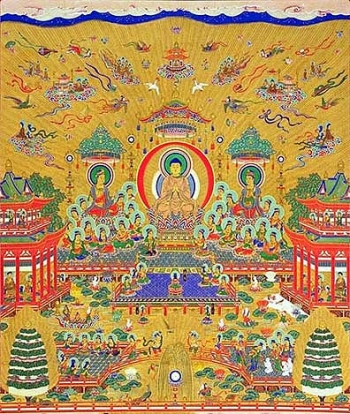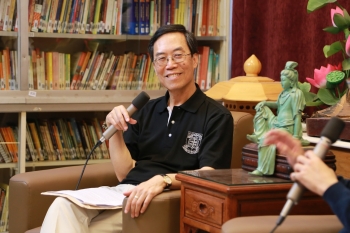Remarks in the Commentary of the Contemplation Sutra
Soon after Master Shandao defined exclusive practice and mixed practice in his Commentary of the Contemplation Sutra, he told us the advantages of exclusive practices and the disadvantages of mixed practices. He said, “Apart from the exclusive primary and secondary practices, all other virtuous practices are regarded as mixed practices. If we practice the former, our mind will be more intimate and closer to Amitabha Buddha. We always cherish the memory of Amitabha Buddha, which is known as the unintermittent mind. If we practice the latter, our mind is always intermittent. Though we may be reborn by dedication, our practices are known as remote, mixed and impure.”
Compared to each other, the advantages of exclusive practices are:
1. An intimate relationship with Amitabha Buddha
2. Practicing close to Amitabha Buddha
3. An unintermittent mind in the memory of Amitabha Buddha
4. Purity in practice
5. Practicing without the need for dedicating merit
And the disadvantages of mixed practices are:
1. Remoteness and less intimacy with Amitabha Buddha
2. Practicing at a distance to Amitabha Buddha
3. An intermittent mind in the memory of Amitabha Buddha
4. Impurity in practice
5. Dedication is required in order to be reborn in the Land of Bliss
In short, the chance of rebirth in the Land of Bliss is smaller with mixed practice.
Remarks in the Praise of the Rites of Rebirth
Master Shandao further wrote, “If a practitioner can perform (the exclusive practice as described above) Amitabha-recitation unintermittently till the end of his life, the chance of rebirth is ten out of ten, a hundred out of a hundred.”Master Shandao listed out four advantages in exclusive practice:
(1) Mindfulness in Amitabha-recitation without any interference by external factors
(2) Correspondence with the fundamental vow of Amitabha Buddha
(3) No violation with the teaching of Amitabha Buddha
(4) In accordance with what Shakyamuni Buddha says.
More importantly, he pointed out that the chance of rebirth of the practitioner who takes exclusive practice is 100%. That is the hope of all Pure Land practitioners.
Master Shandao also pointed out that the chance of rebirth of the practitioner in mixed practice is less than 1 or 2%, or even as low as 0.3 to 0.4%. He says, “ If the practitioner discards the exclusive practice, but takes mixed practice, the chance of being reborn is less than one to two out of a hundred, or even less than three to five out of a thousand.” He listed out nine reasons for this, the first four being the inverse of the four advantages. They are:
1. Loss in mindfulness in Amitabha-recitation due to the disturbance and interference by external assorted factors
2. No correspondence with the fundamental vow of Amitabha Buddha
3. Violation with the teaching of Amitabha Buddha
4. Not in accordance with what the Buddha says
5. Not always thinking of Amitabha Buddha and the Land of Bliss
6. Not always remembering Amitabha Buddha and the Land of Bliss
7. Not sincere and earnest in dedication and aspiration
8. Intermittence with greed, hatred and other false views
9. No regret and repentance on the faults
10. No continuous gratitude for Amitabha Buddha
11. Being arrogant and irreverent, and always related to the worldly fame and benefit though reciting Amitabha Buddha
12. Not close the virtuous practitioners, and keeping oneself away from others
13. Tend to get close the miscellaneous practices that may prevent oneself and others from rebirth in the Land of Bliss
As far as the rebirth in the Land of Bliss is concerned, we understand that exclusive practice in Amitabha-recitation is taken into account, and nothing else. On the other hand, we exclusively recite Amitabha’s name for the purpose of being reborn in the Land of Bliss, and nothing else. This is the characteristic of the Path of Great Vow in Pure Land Buddhism.
‘Mixed practice for merits and virtues’ versus ‘duties and responsibilities’ in our daily life
Exclusive practice does not mean that we do nothing except recite Amitabha’s name 24/7. Before we are reborn in the Land of Bliss, we still live in the mundane world, and have to handle all worldly matters in our daily lives. As the duties and responsibilities of a family member, an employee, a friend, a Buddhist, etc, we have to perform the Five Precepts or Ten Virtuous Deeds, as much as we can, in our family life, our company and social circles, particularly the Buddhist communities. However, we know that these are not directly related to the rebirth in the Land of Bliss.
As a Pure Land practitioner, we have to be sincere in ethics and perform our duties, to avoid misconduct and keep sincerity and to bide by the laws and be a good citizen in society. We take it as our duties and responsibilities, or as the gratitude of our family and friends, but not as practices in Buddhist cultivation for the accumulation of merits and virtues, for the sake of rebirth in the Land of Bliss.
No merits and virtues are involved whatever we do in our daily life in this world. As a Pure Land practitioner, we understand that the only relevant practice for rebirth in the Land of Bliss is Amitabha-recitation, because the merits and virtues of Amitabha’s name are real and perfect, full and complete, and are compatible with the realm of unconditioned nirvana - the Land of Bliss. We do not need any other complimentary or supplementary merits and virtues attained through miscellaneous virtuous practices.
The Pure Land practitioners need not rely on all these works to get rebirth. Good deeds are needed but are considered to be merits and virtues unnecessary for rebirth in the Land of Bliss.
However, if we think these works will be help us get a better chance to get rebirth and attempt to do them as much as possible, it is then regarded as ‘mixed practices’ with the element of ‘self power’. Moreover, it implies that we have doubts on the power of Amitabha Buddha (other-power). In this respect, we cling to the power of karma. It can generate unreal or insubstantial merits and virtues, but remains irrelevant to the Land of Bliss, a realm of unconditioned nirvana.
















